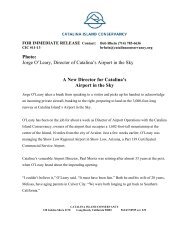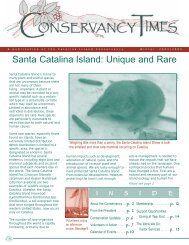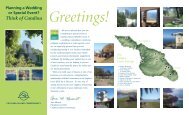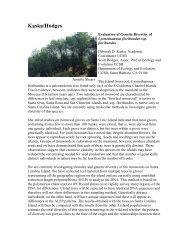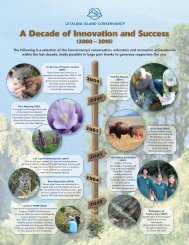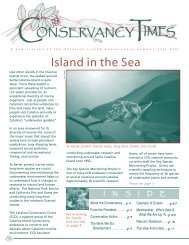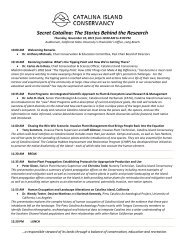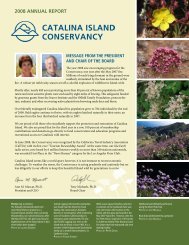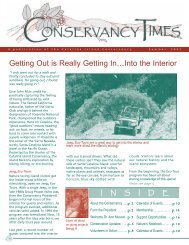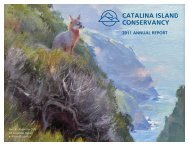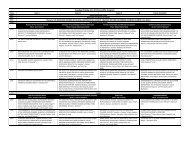Internship Program Policy External - Catalina Island Conservancy
Internship Program Policy External - Catalina Island Conservancy
Internship Program Policy External - Catalina Island Conservancy
Create successful ePaper yourself
Turn your PDF publications into a flip-book with our unique Google optimized e-Paper software.
<strong>Internship</strong> <strong>Program</strong> <strong>Policy</strong><strong>External</strong>Page 1 of 13<strong>Catalina</strong> <strong>Island</strong> <strong>Conservancy</strong> Intern <strong>Policy</strong>
Introduction to the <strong>Conservancy</strong>The mission of the <strong>Catalina</strong> <strong>Island</strong> <strong>Conservancy</strong> is to be a responsible steward for its landsthrough a balance of conservation, education and recreation.The Vision of the <strong>Catalina</strong> <strong>Island</strong> <strong>Conservancy</strong> is to inspire a lifetime of exploration andstewardship of the natural and cultural world by encouraging experiences with the wild thatdeepen understanding of the connections between nature and self. We protect and restore theenvironment on <strong>Catalina</strong>, promoting and modeling ecologically sustainable communities tocreate a healthier future for this <strong>Island</strong> and our Earth.The Santa <strong>Catalina</strong> <strong>Island</strong> <strong>Conservancy</strong> has a central focus on the conservation, education,preservation and restoration of <strong>Catalina</strong> <strong>Island</strong>. Additionally, there is a recreation componentwithin our mission as well. Therefore, it is the organizations desire to provide developmentopportunities to qualified, educated individuals whose primary professional focus will be theprovision of quality services to meet our mission and vision driven goals.About the <strong>Conservancy</strong> <strong>Program</strong>sBISONThe <strong>Conservancy</strong> is responsible for managing its free-roaming bison, with the aim ofmaintaining a vigorous and healthy herd, while minimizing their impact on the important wildlands habitat of <strong>Catalina</strong> <strong>Island</strong>. The <strong>Conservancy</strong> is also committed to recognizing the bison’ssignificance on <strong>Catalina</strong> as a heritage herd woven into the <strong>Island</strong>’s cultural and economic fabric.INVASIVE PLANT REMOVAL<strong>Catalina</strong>’s native plant community is central to the ecosystem of the <strong>Island</strong>. It provides habitatsthat offer shelter and food to the <strong>Island</strong>’s endemic and native animals like the <strong>Catalina</strong> <strong>Island</strong>fox, <strong>Catalina</strong> quail, bald eagles, and many other species. But years of importing non-native plantsto feed grazing animals and landscape homes has introduced to <strong>Catalina</strong> more than 76 highlyinvasive plants. Left unmanaged, these invaders would overtake native habitats, potentiallydooming some to extinction, and harming animals that rely on them for shelter and food.PLANT ECOLOGYIn order to monitor the ecological health of the island and to obtain information for adaptivemanagement of the island, the <strong>Conservancy</strong> conducts field research around <strong>Catalina</strong>. Mappingand monitoring of rare plant populations as well as maintenance of the <strong>Conservancy</strong>’s Herbariumto document our flora is another important component. In areas of recent fires the <strong>Conservancy</strong>maintains enclosures protecting regenerating sensitive plant habitat.HAYPRESS RECREATIONAL AREAThe disastrous 4,750-acre fire on <strong>Catalina</strong> in 2007 swept through the beautiful HaypressRecreational Area and destroyed most of the trees. For many years, Haypress has been animportant recreational area for the community and for visitors, frequently used by residents andvisitors who enjoy the peaceful atmosphere, the views to Haypress Reservoir, hiking trails,Page 2 of 13<strong>Catalina</strong> <strong>Island</strong> <strong>Conservancy</strong> Intern <strong>Policy</strong>
outdoor cooking facilities and a children’s playground. The <strong>Conservancy</strong> is committed torestoring this community resource to its former beauty and improving it for all to enjoy.FAMILIES IN NATURE PROGRAMFamilies In Nature is an outreach initiative designed to enable <strong>Catalina</strong> resident families to gainaccess to nature based activities, and to have what can be life-changing interpretive experiencesat no cost to them.The <strong>Conservancy</strong> believes that the enjoyment of the interior by ALL residents is important forthe well-being of the community and the <strong>Island</strong>’s future. Support of this program will helpcreate a well-informed community who understands and benefits from its native and rare naturalsurroundings, and who will want to protect and restore <strong>Catalina</strong> for generations to come.NATIVE PLANT NURSERYThe flora of <strong>Catalina</strong> <strong>Island</strong> is part of what makes it such a special place. In the late 1980s, the<strong>Catalina</strong> <strong>Island</strong> <strong>Conservancy</strong> established a native plant nursery at Middle Ranch in the <strong>Island</strong>’sinterior. The nursery’s mission is to provide plant and seed material for restoring native habitatson the <strong>Island</strong>. (The nursery was named in memory of Mr. James H. Ackerman, a <strong>Conservancy</strong>Benefactor who also served on the Board of Directors).At the Nursery, plants are grown from seed or from cuttings collected from specimens growingin the wild on the <strong>Island</strong>. Rare habitat plant species, and endemic or federally listed EndangeredSpecies are the primary focus at the facility.FOXESThe <strong>Catalina</strong> <strong>Island</strong> fox is found on <strong>Catalina</strong> <strong>Island</strong> and nowhere else in the world. An adult foxweighs just 4 to 6 pounds, and is about 25% smaller than its mainland ancestor the gray fox. Itsdiet includes mice, lizards, birds, berries, insects, and cactus fruit. It is <strong>Catalina</strong>'s largestterrestrial predator.In late 1999, an outbreak of distemper virus caused the fox population to plummet from about1300 to just 100 animals. In 2000, the <strong>Catalina</strong> <strong>Island</strong> <strong>Conservancy</strong> and its partner, the Institutefor Wildlife Studies, implemented the <strong>Catalina</strong> <strong>Island</strong> Fox Recovery Plan. This plan combinedrelocation, vaccinations, captive breeding and release, and wild fox population monitoring.The effort was a startling success. In 2004, <strong>Catalina</strong>’s fox population had grown toapproximately 300. Because of its success, the captive breeding portion of the program wasdiscontinued. That year, the U.S. Fish and Wildlife Service listed the <strong>Catalina</strong> <strong>Island</strong> fox as afederally “endangered” species.NATURALIST TRAINING PROGRAMThe <strong>Conservancy</strong> is committed to provide accurate, consistent and up-to-date information aboutthe <strong>Island</strong> and its many interesting and rare native plant and animal species, not only to our staffbut to all guides and naturalists on the <strong>Island</strong>. The goal of the Naturalist Training <strong>Program</strong> is todevelop a corps of Master Guides and <strong>Conservancy</strong> educators that will expand the<strong>Conservancy</strong>’s educational outreach.Page 3 of 13<strong>Catalina</strong> <strong>Island</strong> <strong>Conservancy</strong> Intern <strong>Policy</strong>
The training program consists of a thorough combination of classroom-based, field study andpractical experience training. In addition, this program centralizes all training materials and dataupdates to keep all information accurate and current. This <strong>Conservancy</strong> program will serve as amodel of training and preparation of guides for other gateway communities through partnershipand land trust leadership.Project <strong>Internship</strong> <strong>Program</strong>s and ObjectivesEach year a select group of Interns benefit from the mentoring of our conservation, educationand trails professionals during ten-week or longer <strong>Internship</strong> <strong>Program</strong>s. Supporters of thisprogram will help create the next generation of knowledgeable land stewards to protect andrestore the <strong>Island</strong> for many years to come.The Project Supervisors program provides students with an opportunity to develop a core ofknowledge and related skills to prepare for professional work in the areas of conservation,education, preservation, restoration and recreation. This knowledge is complemented byrequirements that students gain practical work experience in the field during their academicexperience.1. What is a <strong>Catalina</strong> <strong>Island</strong> <strong>Conservancy</strong> Intern?After intensive week-long training sessions, the Interns provide direct assistance tosome of the <strong>Conservancy</strong>’s key projects. For example, they lead guided nature walksat sites such as the Wrigley Memorial and Botanical Garden, assist in sowing seeds,transplanting, weeding and watering at the James H. Ackerman Native Plant Nursery,and help to maintain the Trans <strong>Catalina</strong> trail. Interns are also on hand at the TwoHarbors pier and on Front Street in Avalon to answer visitors’ questions about<strong>Catalina</strong> <strong>Island</strong>’s unique natural history and conservation stories, and promote<strong>Conservancy</strong> membership.The aim of the <strong>Internship</strong> <strong>Program</strong> is to provide the student (future professional) with acomprehensive practical experience in a setting where learning is the primary objective of theexperience. To this end, the basic purposes of the <strong>Internship</strong>s are:For the Student: to complete his/her professional preparation program in a controlled andsupervised field experience.For the Organization: to sponsor and guide the student and to interpret the experience while thestudent applies theoretical knowledge and practice.At the end of the <strong>Internship</strong> experience, the student will have achieved the following expectedoutcomes:A. Apply principles of program planning, implementation, and evaluation related torecreation <strong>Internship</strong>s.B. Apply professional program skills and meet performance standards of the program forwhich the <strong>Internship</strong> applied.Page 4 of 13<strong>Catalina</strong> <strong>Island</strong> <strong>Conservancy</strong> Intern <strong>Policy</strong>
C. Recognize, evaluate, and understand own feelings toward conservation, education,preservation and recreation profession and interest in continuing within those fields.D. Integrate theoretical knowledge with the application of program skills involved inrelated professional practice.E. Move from student to level of conservation, education, preservation, or recreationprofessional.2. <strong>Internship</strong> <strong>Program</strong>s OfferedPlant Ecology<strong>Program</strong>: Interns will assist Plant Ecologist with collection of ecological data inresearch plots in recent fire areas and other sites around the island. Fieldwork consistsof identifying plants to species or subspecies and recording intercept data. Occasionalrare plant surveys. Additional duties may include data entry using MS Access, MSExcel, fence repair, and herbarium work.Training areas and skills desired: Previous fieldwork experience, knowledge ofSouthern California botany, plant identification skills, experience in a nursery,horticulture or landscaping, and photography skills preferred. Project Interns must beable to work in remote locations with extreme topographical terrain.Nursery<strong>Program</strong>: Objectives are to create weekly watering and plant inspections schedules tomonitor the health of plants, inventory existing plants and work with volunteers onvarious projects to include transplanting, weeding, seed collecting and generalmaintenance.Training areas and skills desired: Botany and horticulture skills and knowledge,agricultural knowledge, landscaping or conservation, major studies in biology,horticulture and/or environmental studies preferred.Youth and Schools<strong>Program</strong>: This <strong>Program</strong> will assist in coordination of weekly hikes and night timecampfire programs, and provide daily guided interpretive walks through the WrigleyMemorial and Botanical Garden, as well as to provide an outreach table to provideinformation on the <strong>Conservancy</strong> in Two Harbors.Training areas and skills desired: Studies in education, environmental knowledge andinterest, conservation, and must be able and willing to work closely with kids.Naturalists<strong>Program</strong>: Naturalists are the key to providing a meaningful experience to visitors atkey interpretive locations in Avalon and Two Harbors. Naturalists will help tohighlight landscape, natural and cultural features in interesting and engaging wayswhile providing programs to build awareness and support for conservation actions on<strong>Catalina</strong> <strong>Island</strong>.Training areas and skills desired: A basic understanding of conservation andenvironmental studies, desire to converse with people and able to work with thepublic.Page 5 of 13<strong>Catalina</strong> <strong>Island</strong> <strong>Conservancy</strong> Intern <strong>Policy</strong>
Trails<strong>Program</strong>: This program will help maintain 14.88 miles of hiking trails to includetrimming vegetation, tread repair, repair of erosion, repair erosion control devises andweed control. Trails program will also survey trails for needed repair andimprovements.Training areas and skills desired: Knowledge of GPS systems, comfortable hiking upto 10 miles per day, 4WD experience, CPR Certified, know basic word processing,have woodworking/router experience and able to work with volunteers.ACE individual VolunteersThis is a special program through the American Conservation Experience. Forinformation on these programs please ask your <strong>Program</strong> supervisor.<strong>Catalina</strong> Habitat Improvement Recovery <strong>Program</strong> (CHIRP) (Provided throughACE Volunteers)This program is also handled through the American Conservation Experience. Forinformation on these programs please ask your <strong>Program</strong> supervisor.<strong>Conservancy</strong> Project <strong>Internship</strong> Policies1. General Rules and ExpectationsEach <strong>Internship</strong> <strong>Program</strong> within the <strong>Catalina</strong> <strong>Island</strong> <strong>Conservancy</strong> has differentrequirements, training schedules, expected outcomes, and criteria. With these different<strong>Program</strong>s the <strong>Conservancy</strong> also provides different agreements for remuneration, food orhousing accompaniments. It is required that each Intern be reminded that their <strong>Program</strong>is confidential with regards to this information and discussion of any benefits, payments,or accommodations is strictly to be kept private between Intern and <strong>Program</strong> Supervisor.Any Intern having broken this confidentiality will be asked to leave the <strong>Program</strong>immediately.As an Intern, it is important to remember that you have a purpose to fulfill through yourIntern program and that your actions directly reflect on the <strong>Conservancy</strong>. The<strong>Conservancy</strong> takes this commitment seriously and hopes that you will take pride in thework that you accomplish. To ensure that the Project <strong>Internship</strong> <strong>Program</strong> has the bestpossible opportunity to fulfill its objectives, please read the policies listed below:A. Punctuality is essential. Interns will be assigned to commute with various<strong>Conservancy</strong> staff and it is vital that we respect one another’s timeconstraints. There is limited time to get out to field sites and thereforeyou’ll need to make sure that you are on time for all carpools.B. Interns are required to participate in the assigned work projects and to takethis commitment seriously; we entrust our Interns with significant tasksbecause we believe they can help get the message of conservation out in aPage 6 of 13<strong>Catalina</strong> <strong>Island</strong> <strong>Conservancy</strong> Intern <strong>Policy</strong>
powerful way. However no Intern will be required to work should they feelphysically incapable due to illness or injury.C. The <strong>Conservancy</strong> has a zero tolerance policy for illegal drugs. Offenderswill be required to leave the <strong>Internship</strong> <strong>Program</strong> immediately.D. The <strong>Conservancy</strong> requires a no alcohol policy during work or within theLaura Stein Volunteer Camp (where you will be staying), which willcontribute to a safe working and living environment free from potentialproblems associated with intoxication. Those of age must not consumealcoholic intoxicants within twelve (12) hours of a scheduled work shift.Participants are never to be intoxicated for work or when driving a vehicle.The <strong>Catalina</strong> <strong>Island</strong> <strong>Conservancy</strong> has a zero tolerance for violations to thispolicy. Failure to comply will result in participant being required to leavethe <strong>Internship</strong> <strong>Program</strong>. All “of age” participants should limit consumingalcoholic beverages to their in-town visits, consume only in moderation, andalways have a designated driver for such visits.E. While participants are encouraged to fully enjoy their experience and to seekextracurricular activities to enrich their visit, the <strong>Conservancy</strong> strictlyprohibits underage drinking and has zero tolerance for any violations of thispolicy, up to and including full cooperation with local law enforcementofficials. This includes drinking on the camp premises, and driving whileintoxicated.Participants are required to contribute to a safe and responsible program environmentduring the <strong>Internship</strong> <strong>Program</strong>. (Please also be aware that the <strong>Conservancy</strong> will nottolerate racial, social, sexual or religious discrimination on any of our programs).Please arrive to the <strong>Island</strong> prepared to engage in some fairly rigorous hiking and topossibly operate heavy equipment for short periods of time. It is especially importantthat each participant is capable of walking on uneven and very steep terrain. Many of theproject sites are located in remote areas require hiking skill to access.Come with a spirit of adventure and enthusiasm! You will have a great chance to observehow a conservation organization operates. You will see the less traveled sections of the<strong>Island</strong>. Prepare yourselves to encounter an arid chaparral landscape that is also a manytextured,many-hued visual delight in which different habitats lie around every turn andbeneath every hidden canyon and ravine.Each participant is responsible for the daily cooking and cleaning tasks. Treat the campas though it’s your second home. Enjoy it thoroughly and leave it in a state that futureguests will be able to enjoy.2. Safety and Emergency Information<strong>Catalina</strong> <strong>Island</strong> is known for its low crime and small town atmosphere (the mosthazardous encounters, rare as they are, are likely to be with the wildlife).Page 7 of 13<strong>Catalina</strong> <strong>Island</strong> <strong>Conservancy</strong> Intern <strong>Policy</strong>
There are a few project related risks; however, participants will be provided with athorough training for all tools and herbicides prior to their use.Hospital & Police Services: Avalon Hospital, located at 100 Falls Canyon Road, is open24 hours (phone is 310.510.0700). The hospital uses Medivac helicopter for emergenciesthey feel should be treated by a larger more equipped hospital. The Medical Clinic isopen from 9:00am to 4:00pm Monday – Friday (phone is 310.510.0096). The Avalon /Los Angeles County Sheriff’s Department can be contacted directly at 310.510.0174 andwill dispatch immediate assistance in case of emergency. Emergency calls to 9-1-1 aresometimes routed to Long Beach so it is necessary to let them know you are calling from<strong>Catalina</strong> <strong>Island</strong>. Emergency personnel are within 15 minutes of the Laura SteinVolunteer Camp and usually no more than 30 minutes from any work site.Anyone seeking to contact an Intern with an emergency communication needs to call the<strong>Conservancy</strong> main office at 310.510.2595 ext. 0 during regular business hours. Afterhours, they may call the Sheriff’s Department and they will contact a <strong>Conservancy</strong> staffmember who is on call 24 hours a day.In case of an emergency at the project site, <strong>Conservancy</strong> radios will be used to contactemergency personnel.The <strong>Conservancy</strong> does not have any site-specific requirements for medications or shots,though it is highly recommended that all participants are up to date on their tetanus shot(which is good for 10 years). Please carry any essential medications (e.g. inhalers,insulin, allergy medication) with you at all times. There is a pharmacy in Avalon (Leo’sDrugstore 310.510.0189), where participants can purchase any necessary medications.3. Schedules and TrainingUpon arrival in Avalon, Interns will receive an orientation of the <strong>Conservancy</strong> House. Atthis orientation, a representative will explain how the projects fit into the <strong>Conservancy</strong>’smission. Following this presentation, the Volunteer Groups Coordinator will describehow Interns contribute to the success of the organization. At this time you will all fill outnecessary start paperwork. Later, from your <strong>Program</strong> Supervisor, participants willreceive an itinerary listing the upcoming projects and daily schedule. Afterwards youwill have the opportunity to shop for groceries and then be driven to camp. Allparticipants will receive an hour site orientation and a tour of the camp.On your second day you will receive driver training. Vehicle usage information is listedin a later section.Interns will receive an in-depth training during their first week that will include adescription of the purpose of their assignments, followed by detailed procedural andsafety instructions. <strong>Program</strong> Supervisors will lead this training with their assignedInterns at their respective office and field locations. We will seek to create opportunitiesfor the Interns to meet staff and researchers to get a first-hand insight into thePage 8 of 13<strong>Catalina</strong> <strong>Island</strong> <strong>Conservancy</strong> Intern <strong>Policy</strong>
conservation field. Participants are strongly recommended to ask staff any questions thatthey might have. Interns will meet Tachi and Pimu, our animal ambassadors to learnabout restoration practices and wildlife on <strong>Catalina</strong>.Each <strong>Program</strong> Supervisor will go through work schedules with their Interns and allInterns will be expected to follow their schedules diligently. <strong>Program</strong> Supervisors willcommunicate the weekly work schedule by Friday of each week. Outside of this workperiod you will have two free days.Avalon has many fun activities to experience. There are snorkeling, boating, kayaking,parasailing, scuba diving, glass bottom boat, submersible and other tours available inwhich customers can engage the marine environment. Go to http://www.ecatalina.comfor more information on recreation opportunities in Avalon.4. Food and Housing ArrangementsThere is a Vons/Safeway grocery store in Avalon that has a wide selection of food itemsas well as general incidentals. The <strong>Conservancy</strong> will provide logistical support (e.g.transportation) when purchasing food. The outdoor kitchens are equipped with a propanebarbeque, a two-burner stove (no oven), and a supply of cooking and eating utensils.Food storage containers, coolers and ice are also available to store your food.There is also tap water at both camps. Interns need to fill their water bottles or hydrationpacks before departing for each day’s work assignment. It is important to drink plenty ofliquids when working outdoors to avoid dehydration.Housing will be handled on a program by program basis depending on specifics. Most<strong>Internship</strong> <strong>Program</strong>s have housing handled through the Laura Stein Volunteer Camp.Your <strong>Program</strong> Supervisor will have already given you the specifics of your housing priorto your arrival.For paid <strong>Internship</strong> <strong>Program</strong>s, the cost for housing is $300 per month and your <strong>Program</strong>Supervisor will give you the specifics on how this is handled. For unpaid <strong>Internship</strong>s,housing at the camp is included in the program.5. SmokingIn general smoking is not permitted in the interior of the <strong>Island</strong>; however an exception ismade for Interns. Smoking is only permitted at the campfire ring at both camps and isnot permitted during working hours. Smoking will not be tolerated anywhere other thanthese designated areas.Page 9 of 13<strong>Catalina</strong> <strong>Island</strong> <strong>Conservancy</strong> Intern <strong>Policy</strong>
6. Vehicle UsageYou will have a vehicle to commute to work sites and to go into Avalon two (2) days aweek; one for laundry and grocery shopping and the other a free day for recreation. As agroup, you must decide which two days to go into town, which could be on weekends orafter work hours. You will have to go into town as a group in one vehicle. Multiple tripsinto Avalon outside of work are prohibited. Carpooling as much as possible is mandatoryto conserve fuel. Refer to the following section for more details.A. Usage <strong>Policy</strong>The operation of any <strong>Catalina</strong> <strong>Island</strong> <strong>Conservancy</strong> vehicle shall be restricted tothose individuals licensed and qualified by the State of California to operate saidvehicles. The operator of any <strong>Conservancy</strong> vehicle will be in compliance with allapplicable federal, state and local laws as well as all <strong>Catalina</strong> <strong>Island</strong> <strong>Conservancy</strong>rules and policies. A number of stipulations and conditions shall govern the useof all subject vehicles. The rules and conditions are as follows:1. <strong>Conservancy</strong> vehicles will have a weekly pre-trip inspection using astandardized <strong>Conservancy</strong> pre-trip form and any problems found will bereported to Evan Sutherland, the <strong>Conservancy</strong> mechanic, and your <strong>Program</strong>Supervisor. It shall be the responsibility of the driver to determine whether itis safe to proceed with an existing condition.2. Driver must conduct a walk around and complete the Vehicle Log Booklocated in each vehicle each time a vehicle is used.3. Fuel can be charged to the Volunteer Department at the pebbly Beach gasstation. The driver will be responsible for using the proper code, andfollowing established procedures when getting fuel.4. In order to keep fuel usage to an acceptable level, therefore keeping the costdown, unnecessary travel using <strong>Conservancy</strong> vehicles in prohibited. Vehicleuse on your day off is subject to usage fees, like all regular <strong>Conservancy</strong>employees at a rate of $.55 cents per mile, so carpooling is recommended.Your <strong>Program</strong> Supervisor will provide mileage sheets to fill out when usingthe vehicle for free day use.5. <strong>Conservancy</strong> vehicles will be available for use by the group to commute to thework sites, and for personal use two days per week. Interns may drive toAvalon, Little Harbor, or any destinations along the way; however, they maynot drive beyond Little Harbor unless authorized by their <strong>Conservancy</strong><strong>Program</strong> Supervisor. With gas prices being as high as they are on the <strong>Island</strong>,the group may not drive to any permitted area more than once in a day. Thisbeing the case; plan your outings with care. We are offering this vehicle useas a privilege for getting groceries and mail, doing laundry, and experiencingthe <strong>Island</strong> to a greater degree than is generally possible.Page 10 of 13<strong>Catalina</strong> <strong>Island</strong> <strong>Conservancy</strong> Intern <strong>Policy</strong>
6. While driving any <strong>Conservancy</strong> vehicle the group will at all times observe allapplicable <strong>Conservancy</strong> policies and procedures. Courtesy and thoughtfulnesswill always be the benchmark while driving <strong>Conservancy</strong> equipment. Wemust remember that we are representatives of our respective organizations andwe need to set the best example possible.Have fun while out seeing the <strong>Island</strong>! Local <strong>Island</strong> residents have limited accessto the interior so please appreciate the privilege of enjoying the <strong>Island</strong>.B. Vehicle TrainingUpon arrival, all licensed drivers who will be using <strong>Conservancy</strong> vehicles to takeInterns to and from the various project sites will be reminded about the vehicleusage and confirmed receiving this section. This section spells out in details thepermitted use of <strong>Conservancy</strong> vehicles as well as the procedures and care requiredof anyone using our vehicles. All persons in a <strong>Conservancy</strong> vehicle have aresponsibility to make sure they follow all rules however it will be theresponsibility of the driver should any rules not be followed.Training will be given by the <strong>Program</strong> Supervisor and /or a qualified <strong>Conservancy</strong>volunteer driver and will train each driving Intern the procedures to be followedwhen using <strong>Conservancy</strong> vehicles. Areas of training will include:1. The <strong>Program</strong> Supervisors and /or qualified <strong>Conservancy</strong> volunteer driver willgive the Interns an area orientation that will stress the operation parameters ofthe subject vehicles.2. The drivers will be shown the places where we fuel our vehicles and the codesand procedures we use to do so. The drivers will be introduced to allindividuals involved in the fueling process.3. The drivers will be introduced to our mechanics and will be instructed as toprocedures the mechanics want to see adopted with regards to the operation ofour vehicles.4. Pre-trip sheets and a clipboard will be provided for the driver’s use duringtheir stay. Instruction as to the proper procedure for filling out the pre-tripsheets will be provided and the place where those sheets are to be turned inwill be designated.5. Proper radio use and instruction in <strong>Conservancy</strong> radio protocol will be given.6. All drivers will be given a practical test to assess their assimilation of theinstructions given.7. No persons, other than those drivers who have completed our vehicle trainingorientation shall at any time operate a <strong>Conservancy</strong> vehicle. <strong>Conservancy</strong>Page 11 of 13<strong>Catalina</strong> <strong>Island</strong> <strong>Conservancy</strong> Intern <strong>Policy</strong>
vehicle orientation shall not be construed to supersede federal, state or localstatutes and regulations; nor should the training provided be thought of assuspending prudence or common sense.Final NotesThe <strong>Conservancy</strong> invites our Interns to join in our mission to conserve the plant and animal lifeof the <strong>Conservancy</strong>’s lands. We celebrate this opportunity to share in the important task ofenvironmental protection. As collaborators and co-laborers, Interns will help revitalize andmaintain ecosystems on <strong>Catalina</strong> <strong>Island</strong> and gain the skills and knowledge to apply conservationpractices within their home communities. Members will work on projects that addresscommunity needs, including sustainable ecosystems preservation and revitalization. Eachproject is vital to restoring and preserving <strong>Catalina</strong> for perpetuity. (This island is a livinglaboratory that yields insights as to how to redress negative human impacts on the land). We arehappy to affiliate with like-minded individuals in our goal to preserve this place of natural beautyfor future generations to enjoy.The <strong>Conservancy</strong> hopes that all participants will come away from their experience moreeducated and aware of environmental issues while contributing to the vital restoration projectsthat the <strong>Conservancy</strong> has begun. Interns are provided with educational opportunities in thehopes that they will take what they learned during their <strong>Program</strong> and make a difference in theirown communities.Participation AcknowledgementPlease go through this package of information and ask your <strong>Program</strong> Supervisor any questionsyou might have. The next page is the <strong>Internship</strong> <strong>Program</strong> Participation Agreement that you willsign and hand to your <strong>Program</strong> Supervisor. Please make sure you ask any questions you havebefore you sign this form to ensure agreement of participation policies. This package is for youto keep and refer to.Page 12 of 13<strong>Catalina</strong> <strong>Island</strong> <strong>Conservancy</strong> Intern <strong>Policy</strong>
Project Intern Participation AgreementThe <strong>Catalina</strong> <strong>Island</strong> <strong>Conservancy</strong> has designed this form with the goal of ensuring that everyonewho participates in our <strong>Internship</strong> <strong>Program</strong>s has an enjoyable experience. In order to reach thisgoal it is important that each person come with a desire to serve a common cause, that ofinvesting one’s heartfelt energy into keeping <strong>Catalina</strong>’s natural setting beautiful and healthy.Together we can preserve this <strong>Island</strong> as a refuge that future generations can explore in all its wildglory. Below are some “agreements and acknowledgements” that we ask each Intern to makewhen you commit to participating in this <strong>Internship</strong>. We would like to encourage a friendlyatmosphere in which each participant seeks to promote the best interests of the other participants.By agreeing to these terms you are actually helping to make the experience positive for everyoneconcerned.Please initial each section and write your signature at the bottom of the page to indicate youracceptance of these terms._____ I agree to have an open minded attitude towards my fellow participants. I will be open tomeeting and conversing with people from a diverse range of backgrounds._____ I agree to cultivate a positive atmosphere by conducting myself in a respectful manner._____ I am able to perform strenuous physical activities involving hiking on steep, uneventerrains and working outdoors under a wide range of temperatures and weatherconditions._____ I will direct concerns, questions, or complaints directly to and only to my <strong>Program</strong>Supervisor and other larger concerns to the Human Resources Manager._____________ I agreeto demonstrate a cooperative spirit in which I will do my part to assist with communal activitiessuch as camp clean up and to take an active role in each day’s work assignments._____ I acknowledge and agree to follow the General Rules and Expectations_____ I acknowledge and agree to follow the Confidentiality rules and Alcohol Policies set forthin General Rules and Expectations_____ I acknowledge and agree to follow the Smoking <strong>Policy</strong>_____ I acknowledge and agree to follow the Vehicle Usage <strong>Policy</strong> whether I am a designatedIntern driver or participating in an activity as a rider.By signing on the line below you are committing to following the guidelines and policies listedabove and in your Intern <strong>Policy</strong> package.Signature: ___________________________________ Date: ___________________________<strong>Program</strong> Supervisor Signature: _______________________________ Date: ______________Page 13 of 13<strong>Catalina</strong> <strong>Island</strong> <strong>Conservancy</strong> Intern <strong>Policy</strong>





